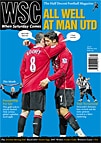 A groundbreaking season for a predecessor to the Conference, with a first sponsor and, even more radical, an extra point for an away win. Geoff Wallis looks back
A groundbreaking season for a predecessor to the Conference, with a first sponsor and, even more radical, an extra point for an away win. Geoff Wallis looks back
The long-term significance
The season marked the first sponsorship of the topmost tier of the non-League pyramid, with the sportswear company Gola (which had previously backed Roy Race’s Melchester Rovers) providing financial backing (GM Vauxhall took over in 1986‑87 and the division became known as the Conference). It was also the second year of a three-season experiment in which teams were awarded one point for a draw, two for a home win and three for an away win.
Story of the season
The points system benefited those teams with the best away records, most notably eventual champions Wealdstone, who gained 38 of their eventual 62 points away from their Lower Mead stadium (now a Tesco superstore). The core of the team had been part of the successful Southern League championship-winning side of 1982 and relied heavily upon the central defensive pairing of Paul Bowgett and Dennis Byatt, Robin Wainwright and Neil Cordice in midfield, plus Neil’s brother Alan and new signing Andy Graham up front. The latter scored a spectacular goal, a thrilling overhead kick, just two minutes into the FA Trophy final against Boston United, which Wealdstone went on to win 2-1, thus becoming the first team to complete the non-League double.
Nuneaton Borough finished runners-up for the second season running, thanks largely to the efforts of Paul Culpin, whose 36 goals followed 41 hotshots the previous season, leading to a short-lived stay in the big time at Coventry. Newly promoted Dartford, managed by John Still, were the surprise package of the season, and another team whose away form outshone that at home.
The greatest losers from the points system were Bath City, who achieved what is still their highest position in the pyramid and would have been champions if three points for all wins had applied. Bath were also rejected for Football League membership at the end of the season.
Yeovil called up some 40 players in their unsuccessful attempt to avoid the drop, yet still remained the best-supported club, with an average home attendance of almost 1,300. Frickley Athletic toyed with relegation for some time before reviving, while Worcester City, leaders before Christmas, plummeted in the new year.
Telford United embarked on a brilliant FA Cup run, defeating Lincoln, Preston (in a remarkable 4-1 away win), Bradford City and Darlington, before losing 3-0 in the fifth round to Everton at Goodison Park (and the score was still 0-0 at half-time).
For the record books
Barnet’s 7-0 thrashing of Wealdstone – who had won the title and were resting players for Wembley – was the season’s biggest victory, while Bath contrived to lose 6-1 at home to Kettering.
Same place today
Only Altrincham, Dagenham & Redbridge (albeit in rejuvenated form), Northwich, Kidderminster and Weymouth are currently playing in the Conference.
Moved furthest away
League One high-flyers Yeovil have moved the furthest upwards, while Barnet and Boston are in League Two. Several of the remaining teams, most notably Maidstone, Dartford and Telford, have been reborn after experiencing financial calamity, but Runcorn, the 1982 champions, folded in 2006 (a supporters-led Runcorn Linnets FC play in the North West Counties League). Wealdstone have had to groundshare since leaving Lower Mead in 1991 and are in Ryman League One South.
Went on to greater things
Kevin Blackwell ~ The Boston United goalkeeper saved a penalty in the FA Trophy final against Wealdstone, subsequently signing for Barnet before being purchased three times by Neil Warnock.
Vinnie Jones ~ A glittering film career was still a million miles away for the Watford-born, self-styled hard man, who made his debut for Wealdstone in 1984 and signed for Wimbledon in 1986.
Stuart Pearce ~ The ex-Wealdstone Clash fan signed for Forest from Coventry in 1985 as the makeweight in a £300,000 deal involving centre-back Ian Butterworth.
Disappearing from view
George Armstrong ~ The Arsenal Double-winner left a coaching job at QPR to take up the managerial reins at Worcester City, but failed to save them. Though later a coach at Arsenal, he never managed again.
Ian Botham ~ After five years of occasional appearances for Scunthorpe, “Beefy” signed for Yeovil in January and played in a rare win against Barnet before heading off to a 5-0 thrashing in the West Indies.
David Needham ~ The former Notts County, QPR and Nottm Forest centre-half became Kettering’s boss. Two mid-table seasons followed, but then a record 8-0 defeat at Sutton ended his managerial career.
From WSC 24o February 2007. What was happening this month